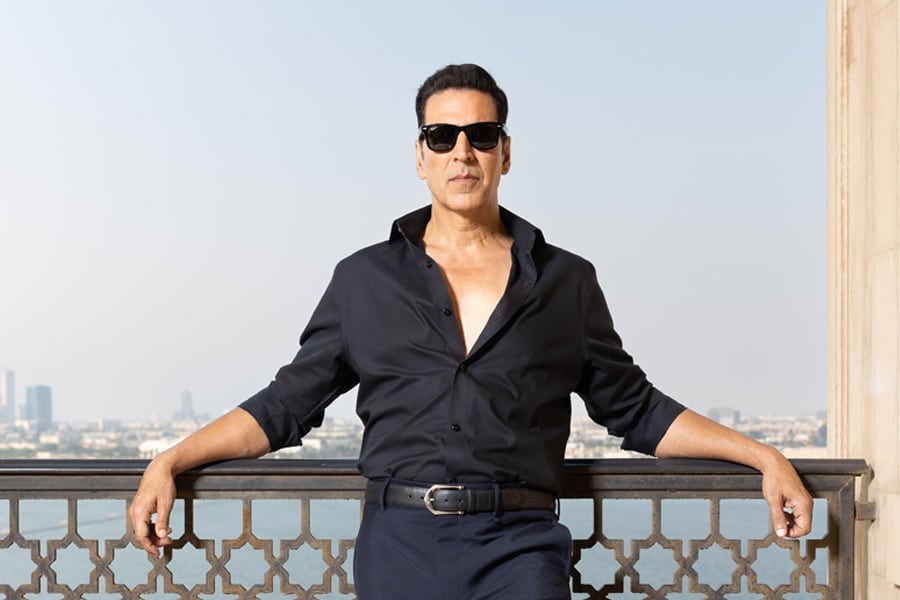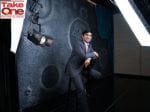Every failure teaches you the value of success and increases the hunger for it further: Akshay Kumar
The superstar on looking for a silver lining amid box office lows, breaking the barrier of 'mindset of limitation' as an outsider, how his discipline and work ethic have kept him going for over three decades, and the kind of cinema he wants to be a part of in the future
 Akshay Kumar, Image: Daniele Venturelli/Getty Images
Akshay Kumar, Image: Daniele Venturelli/Getty Images
Akshay Kumar has seen the best and worst of the film industry since making his acting debut in 1991. Of late, he’s had to experience a series of flops, the most recent being Sarfira, based on the life of Air Deccan founder Captain Gorur R Iyengar Gopinath, the pioneer in low-cost aviation. The 56-year-old will next be seen in Khel Khel Mein, his third release of the year. In an interaction with Forbes India, the superstar speaks about experiencing failure, his passion for work, and the need to provide audience with entertaining content. Edited excerpts:
Q. What drew you to do Sarfira? What aspect of the story intrigued you the most?
When I first heard the story of Sarfira, I was instantly captivated by the audacity and vision of Captain Gopinath. His dream of creating a low-cost airline in India is nothing short of revolutionary. What intrigued me the most was the way he faced numerous obstacles, his resilience, his passion and determination. The story is not just about aviation but about breaking barriers, challenging norms, and believing in the impossible. That kind of story was inspiring and aligned perfectly with the kind of cinema I want to be a part of.
Q. Which is the biggest barrier that you broke in life to become the superstar that you are?
I believe the biggest barrier I had to overcome was the mindset of limitation. Coming from a humble background, the idea of making films in Bollywood seemed like a distant dream to me. The industry is competitive, and breaking into it requires more than just talent—it requires resilience, hard work and a bit of luck. But I was stubborn and adamant. So, I took a leap, trusted my instinct and stayed focussed on my goals. That persistence has been crucial in shaping my journey.
Q. In a journey of over 30 years, you have seen unprecedented highs and lows, the recent rough patch being the latest. How would you compare this phase with the 16 flops early on in your career? Have you learnt to deal with failure differently? How easy or difficult is it to move on?
Behind every film there is a lot of blood, sweat and passion that goes in. It is heart-breaking to see any film fail. But you have to learn to see the silver lining. Every failure teaches you the value of success and increases the hunger for it even further. Luckily, I learnt to deal with it earlier on in my career. Of course, it hurts and impacts you, but that won’t change the fate of the film. It’s not something which is in your control… what is in your control is to work harder, make amends and give it your all to your next film. That’s how I channel my energy and try to move on to the next, focusing my energy where it matters the most.
Q. At the same time, it’s commendable that you remain on top even now. What has been your biggest strength? How do you motivate yourself?
My biggest strength has been my discipline and work ethic. I literally work on a time-table… I sleep, eat and work at a particular time, and shoot for a specific number of hours. I have followed this for years. Staying fit—both mentally and physically—has also played a crucial role in my longevity in the industry. The motivation comes from a genuine love for what I do and to continue making films on which so many livelihoods depend. Also, the support and love from my fans fuel my passion and commitment in this journey.
Also read: You must have the spirit of optimism, that good things will happen: Air Deccan's Captain Gopinath
Q. Post Covid, one has seen the audience thinning in theatres. Has that changed the way you approach your films or the projects you choose?
The pandemic has undoubtedly changed the dynamics of the film industry. With audiences being more selective about their cinema outings, it has become crucial to choose projects that offer something completely entertaining and unique. I’ve become more mindful of the content, ensuring that it resonates with the current times and provides an experience that justifies a trip to the theatre. It’s about finding stories that not only entertain but also connect deeply with the audience.
Q. What has been the ‘Sarfira’ moment of your life?
It would be the decision to make a shift from action films to comedy. Being trained in martial arts, action came to me with ease, to a point where I was cast in roles not on the basis of my acting but because I could do a certain stunt. No one would offer me roles in drama, romance, let alone comedy films because it was perceived, and even said to me on occasions, that it is something I cannot do. And then one day, Priyan Sir [filmmaker Priyadarshan] offered me a role in Hera Pheri, an out-and-out comedy. I went ahead and did it against all odds. I decided to dismantle and reassemble, and managed to do what even I thought I couldn’t—comedy. And after a few years, once again this ‘Sarfira’ moment came in my life when I took a leap of faith and made a shift to [doing] social films.
Q. Did you see Soorarai Pottru, the Tamil version of Sarfira? How did you interpret the character mentally?
Yes, I have seen Soorarai Pottru, and I loved it. I knew this story was for a larger audience because its core elements have a universal appeal. For my character, I went deeper into the psyche of someone who is a visionary yet incredibly grounded. Mentally, I approached the character as someone who constantly battles the odds but does so with a purpose and clear vision. Understanding his motivations and sacrifices came easy to me because much of his story has similarities to my early-day struggles. That helped me understand and make the character my own. It was about capturing the essence of a man who is both a dreamer and a doer.
Q. What was the experience of working with director Sudha Kongara?
Working with Sudha Kongara was an absolute pleasure. She is a director with a clear vision and a deep understanding of her craft. Before Sarfira, I had seen some of her work, and I was thoroughly impressed by her storytelling abilities and her attention to detail. On set, her passion for the project was evident, and she brought out the best in everyone.


















